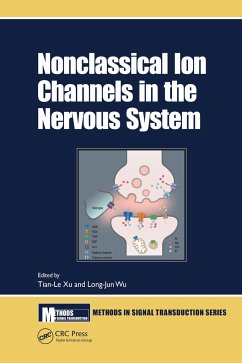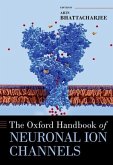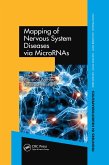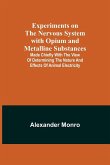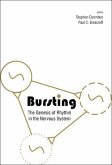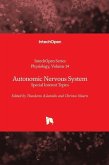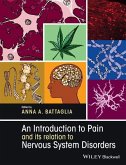Nonclassical Ion Channels in the Nervous System
Herausgeber: Tian-Le, Xu; Wu, Long-Jun
Nonclassical Ion Channels in the Nervous System
Herausgeber: Tian-Le, Xu; Wu, Long-Jun
- Gebundenes Buch
- Merkliste
- Auf die Merkliste
- Bewerten Bewerten
- Teilen
- Produkt teilen
- Produkterinnerung
- Produkterinnerung
Ion channels generate bioelectricity. Recent findings have documented the biophysical properties, the structure, assembly and regulation, and function and dysfunction of nonclassical nervous system ion channels. This book reviews nonclassical ion channel research, ranging from the basic biology, structure, regulations to their functions not only in normal physiology but also neurological disorders, using a variety of cutting-edge techniques and novel animal models.
Andere Kunden interessierten sich auch für
![The Oxford Handbook of Neuronal Ion Channels The Oxford Handbook of Neuronal Ion Channels]() The Oxford Handbook of Neuronal Ion Channels282,99 €
The Oxford Handbook of Neuronal Ion Channels282,99 €![Ion Channels in Health and Sickness Ion Channels in Health and Sickness]() Ion Channels in Health and Sickness89,99 €
Ion Channels in Health and Sickness89,99 €![Mapping of Nervous System Diseases Via Micrornas Mapping of Nervous System Diseases Via Micrornas]() Mapping of Nervous System Diseases Via Micrornas220,99 €
Mapping of Nervous System Diseases Via Micrornas220,99 €![Experiments on the Nervous System with Opium and Metalline Substances; Made Chiefly with the View of Determining the Nature and Effects of Animal Electricity Experiments on the Nervous System with Opium and Metalline Substances; Made Chiefly with the View of Determining the Nature and Effects of Animal Electricity]() Alexander MonroExperiments on the Nervous System with Opium and Metalline Substances; Made Chiefly with the View of Determining the Nature and Effects of Animal Electricity17,99 €
Alexander MonroExperiments on the Nervous System with Opium and Metalline Substances; Made Chiefly with the View of Determining the Nature and Effects of Animal Electricity17,99 €![Bursting: The Genesis of Rhythm in the Nervous System Bursting: The Genesis of Rhythm in the Nervous System]() Stephen Coombes / et.al.Bursting: The Genesis of Rhythm in the Nervous System178,99 €
Stephen Coombes / et.al.Bursting: The Genesis of Rhythm in the Nervous System178,99 €![Autonomic Nervous System - Special Interest Topics Autonomic Nervous System - Special Interest Topics]() Autonomic Nervous System - Special Interest Topics136,99 €
Autonomic Nervous System - Special Interest Topics136,99 €![An Introduction to Pain and Its Relation to Nervous System Disorders An Introduction to Pain and Its Relation to Nervous System Disorders]() Anna BattagliaAn Introduction to Pain and Its Relation to Nervous System Disorders210,99 €
Anna BattagliaAn Introduction to Pain and Its Relation to Nervous System Disorders210,99 €-
-
-
Ion channels generate bioelectricity. Recent findings have documented the biophysical properties, the structure, assembly and regulation, and function and dysfunction of nonclassical nervous system ion channels. This book reviews nonclassical ion channel research, ranging from the basic biology, structure, regulations to their functions not only in normal physiology but also neurological disorders, using a variety of cutting-edge techniques and novel animal models.
Hinweis: Dieser Artikel kann nur an eine deutsche Lieferadresse ausgeliefert werden.
Hinweis: Dieser Artikel kann nur an eine deutsche Lieferadresse ausgeliefert werden.
Produktdetails
- Produktdetails
- Verlag: CRC Press
- Seitenzahl: 428
- Erscheinungstermin: 20. August 2021
- Englisch
- Abmessung: 240mm x 161mm x 27mm
- Gewicht: 804g
- ISBN-13: 9780367623951
- ISBN-10: 0367623951
- Artikelnr.: 62234069
- Herstellerkennzeichnung
- Libri GmbH
- Europaallee 1
- 36244 Bad Hersfeld
- gpsr@libri.de
- Verlag: CRC Press
- Seitenzahl: 428
- Erscheinungstermin: 20. August 2021
- Englisch
- Abmessung: 240mm x 161mm x 27mm
- Gewicht: 804g
- ISBN-13: 9780367623951
- ISBN-10: 0367623951
- Artikelnr.: 62234069
- Herstellerkennzeichnung
- Libri GmbH
- Europaallee 1
- 36244 Bad Hersfeld
- gpsr@libri.de
Tian-Le Xu, PhD, Principal Investigator and Professor Collaborative Innovation Center for Brain Science, Department of Anatomy and Physiology, Shanghai Jiao Tong University School of Medicine, Shanghai Dr. Tian-Le Xu obtained PhD of Neurobiology from Fourth Military Medical University. He did his postdoc training at Kyushu University and then joined University of Science and Technology of China as Professor. He was a principal investigator at Institute of Neuroscience, Chinese Academy of Sciences. Currently, he is Professor at Department of Anatomy and Physiology, Shanghai Jiao Tong University School of Medicine. Dr. Xu's research focuses on neuronal signaling and related neural disorders including chronic pain and ischemic stroke, with an emphasis on the role of acid-sensing ion channels (ASICs) in these processes. The research from Dr. Xu's lab has unveiled rich and new knowledge on the regulation and diverse functions of ASICs in health and disease. Long-Jun Wu, PhD, Professor and Consultant Department of Neurology, Mayo Clinic Dr. Long-Jun Wu received PhD of Neurobiology from University of Science and Technology of China. After postdoc trainings at University of Toronto and Harvard Medical School, Dr. Wu was Instructor at Harvard Medical School and then Assistant Professor at Rutgers University. Currently, he is Professor and Consultant at Department of Neurology, Mayo Clinic. Dr. Wu's recent research primarily focuses on the neuroimmune interaction, particularly the function of microglial ion channels and receptors, in normal and diseased brain. By understanding and manipulating microglial functions, Dr. Wu's research aim to develop potential therapeutics targeting microglia in the treatment of various neurological disorders, such as epilepsy, chronic pain, stroke, neurodegeneration and autoimmune neurology.
Preface. Editors. Contributors. Endogenous Activation and
Neurophysiological Functions of Acid-Sensing Ion Channels. Acid-Sensing Ion
Channels and Synaptic Plasticity: A Revisit. Trimeric Scaffold Ligand-Gated
Ion Channels. Eukaryotic Mechanosensitive Ion Channels. Ion Channels in
Human Pluripotent Stem Cells and Their Neural Derivatives. Exocytosis of
Nonclassical Neurotransmitters. Nonclassical Ion Channels in Learning and
Memory. Neuropeptide Regulation of Ion Channels and Food Intake. Prefrontal
Inhibitory Signaling in the Control of Social Behaviors. Studying Brain
Function Using Non-human Primate Models. Application of In Vivo Ca2+
Imaging in the Pathological Study of Autism Spectrum Disorders.
Nonclassical Ion Channels in Depression. Ion Channels of Reward Pathway in
Drug Abuse. Ion Channel Conformational Coupling in Ischemic Neuronal Death.
Nonclassical Ion Channels and Ischemia. Transient Receptor Potential
Channels and Itch. Two-Pore Domain Potassium Channels in Pain and
Depression. Lysosomal Ion Channels and Human Diseases. Microglial
Voltage-Gated Proton Channel Hv1 in Neurological Disorders. Index.
Neurophysiological Functions of Acid-Sensing Ion Channels. Acid-Sensing Ion
Channels and Synaptic Plasticity: A Revisit. Trimeric Scaffold Ligand-Gated
Ion Channels. Eukaryotic Mechanosensitive Ion Channels. Ion Channels in
Human Pluripotent Stem Cells and Their Neural Derivatives. Exocytosis of
Nonclassical Neurotransmitters. Nonclassical Ion Channels in Learning and
Memory. Neuropeptide Regulation of Ion Channels and Food Intake. Prefrontal
Inhibitory Signaling in the Control of Social Behaviors. Studying Brain
Function Using Non-human Primate Models. Application of In Vivo Ca2+
Imaging in the Pathological Study of Autism Spectrum Disorders.
Nonclassical Ion Channels in Depression. Ion Channels of Reward Pathway in
Drug Abuse. Ion Channel Conformational Coupling in Ischemic Neuronal Death.
Nonclassical Ion Channels and Ischemia. Transient Receptor Potential
Channels and Itch. Two-Pore Domain Potassium Channels in Pain and
Depression. Lysosomal Ion Channels and Human Diseases. Microglial
Voltage-Gated Proton Channel Hv1 in Neurological Disorders. Index.
Preface. Editors. Contributors. Endogenous Activation and
Neurophysiological Functions of Acid-Sensing Ion Channels. Acid-Sensing Ion
Channels and Synaptic Plasticity: A Revisit. Trimeric Scaffold Ligand-Gated
Ion Channels. Eukaryotic Mechanosensitive Ion Channels. Ion Channels in
Human Pluripotent Stem Cells and Their Neural Derivatives. Exocytosis of
Nonclassical Neurotransmitters. Nonclassical Ion Channels in Learning and
Memory. Neuropeptide Regulation of Ion Channels and Food Intake. Prefrontal
Inhibitory Signaling in the Control of Social Behaviors. Studying Brain
Function Using Non-human Primate Models. Application of In Vivo Ca2+
Imaging in the Pathological Study of Autism Spectrum Disorders.
Nonclassical Ion Channels in Depression. Ion Channels of Reward Pathway in
Drug Abuse. Ion Channel Conformational Coupling in Ischemic Neuronal Death.
Nonclassical Ion Channels and Ischemia. Transient Receptor Potential
Channels and Itch. Two-Pore Domain Potassium Channels in Pain and
Depression. Lysosomal Ion Channels and Human Diseases. Microglial
Voltage-Gated Proton Channel Hv1 in Neurological Disorders. Index.
Neurophysiological Functions of Acid-Sensing Ion Channels. Acid-Sensing Ion
Channels and Synaptic Plasticity: A Revisit. Trimeric Scaffold Ligand-Gated
Ion Channels. Eukaryotic Mechanosensitive Ion Channels. Ion Channels in
Human Pluripotent Stem Cells and Their Neural Derivatives. Exocytosis of
Nonclassical Neurotransmitters. Nonclassical Ion Channels in Learning and
Memory. Neuropeptide Regulation of Ion Channels and Food Intake. Prefrontal
Inhibitory Signaling in the Control of Social Behaviors. Studying Brain
Function Using Non-human Primate Models. Application of In Vivo Ca2+
Imaging in the Pathological Study of Autism Spectrum Disorders.
Nonclassical Ion Channels in Depression. Ion Channels of Reward Pathway in
Drug Abuse. Ion Channel Conformational Coupling in Ischemic Neuronal Death.
Nonclassical Ion Channels and Ischemia. Transient Receptor Potential
Channels and Itch. Two-Pore Domain Potassium Channels in Pain and
Depression. Lysosomal Ion Channels and Human Diseases. Microglial
Voltage-Gated Proton Channel Hv1 in Neurological Disorders. Index.

